Self-assessment with AP Inter 1st Year Sanskrit Model Papers Set 2 allows students to take charge of their own learning.
AP Inter 1st Year Sanskrit Model Paper Set 2 with Solutions
Time : 3 Hours
Max Marks : 100
सूचना : प्रथम, द्वितीय, तृतीयप्रश्नान् अनुवादप्रश्नं च विहाय अन्ये प्रश्नाः संस्कृतभाषायामेव समाधातव्याः ।
1. एकं श्लोकं पूरयित्वा भावं लिखत । (6 × 1 = 6M)
अ) दुर्जनः परिहर्तव्यो ……………….. न भयङ्करः ||
जवाब:
दुर्जनः परिहर्तव्यो विद्ययाऽलङ्कतोऽपि सन् ।
मणिना भूषितः सर्पः किमसौ न भयङ्करः ||
A wicked person, even though adorned with education, should be avoided. Is not a serpent terrible even though bedecked with a jewel ?
आ) चला लक्ष्मीः ……………….. हि निरचलः ॥
जवाब:
चला लक्ष्मीः, चलाः प्राणाः, चलं जीवितयौवनम् ।
चलाचले च संसारे धर्म एको हि निश्चयः ॥
Wealth is impermanent, life is impermanent, youth is impermanent, and in this impermanent world, dharma alone is permanent.
II. एकं निबन्धप्रश्नं समाधत्त । (6 × 1 = 6M)
अ) दशरथस्य दुःखं कथं स्वयंकृतमासीत –
जवाब:
Introduction : The lesson दशरथस्य पश्चात्ताप: is an extract from the Ayodhya Kanda of Ramayana, written by Sage Valmiki. Rama went to the forest at the command of Kaikeyi. Dasaratha could not bear separation from Rama. Then he told Kausalya that he was cursed by a sage during his youth.
Dasaratha’s Lamentation :
Dasaratha told Kausalya that one would receive the good or bad fruits of one’s own deeds only. Dasaratha committed a sin during his youth. He was famous for his ability to shoot at sound. He received the fruit of his action just as a boy who had eaten poison out of ignorance.
Going for hunting at night :
Once, when it was rainy season, Dasaratha went to the bank of river Sarayu at night for hunting. There, he heard the sound of a pitcher being filled with water. He mistook it for the sound made by an elephant and released an arrow towards that sound. अचक्षुर्विषये घोषं वारणस्येव नर्दतः ।
The painful human cry :
Then he heard a human voice crying how anyone could hit a hermit, who came to the river to carry water. He grieved for his old parents. It was a cruel stupid, who killed all of them.
Dasaratha found a boy :
Dasaratha rushed to the bank of the river to find a hermit hit by his arrow. His hair was scattered, and the water pitcher fell at a distance. The boy asked the king what harm he did to him. He was about to carry water to his parents. Dasaratha killed his parents also who were weak and blind. He asked Dasaratha to carry the news to his father. पितुस्त्वमेव मे गत्वा शीघ्रमाचक्ष्व राघव ।
The old and blind couple :
Carrying the water pot, Dasaratha went to the hermitage and saw the weak and blind parents of the boy who were without any support, and who looked like birds with clipped wings. The old man thought that it was his son, and asked him to give him some water. Then Dasaratha said that he was not their son, and he was Dasaratha, a Kshatriya. He told them that he went at night to the bank of the river Sarayu to kill any wild animal or an elephant that came to drink water. He mistook the sound of filling a pitcher with water for that of an elephant, and killed it with an arrow. द्विपोऽयमिति मत्वाऽयं बाणेनाभिहतो मया । But he saw their son with the arrow struck in the heart.
The curse uttered by the old man :
On hearing those cruel words, the sage could not control his emotion. He cursed Dasaratha saying that he would die lamenting for his son. एवं त्वं पुत्रशोकेन राजन् कालं करिष्यसि ।
![]()
आ) “अमरवाणीप्रशस्तिः” इत्यस्य पाठ्यभागस्य सारांशं लिखत |
जवाब:
Introduction: The lesson अमरवाणीप्रशस्तिः is taken from सुरवाणीमणिहारः written by Sri E. Sathakopacharya. The greatness of Sanskrit, the language of the gods is described in a beautiful way in this lesson.
Salutations to Amaravani: The poet salutes to Sanskrit, which is affectionately fondled by Brahma and other gods, praised by Valmiki, Vyasa and other poets, and decorated by Kalidasa and other poets.
The poet says that the speech of the gods has descended to the earth showing compassion on humans, who cannot roam in the heaven or enjoy with the celestial damsels. धरणिममरवाणि प्राप्य नाकीकरोषि ।
He further says that had not the goddess come down thus, men would have fallen in the well of birth and death. Because they would not have known god.
The greatness of Sanskrit:
The poet says that Sanskrit is the mother of all languages. भवसि सकलभाषाजन्मदात्री यत्स्तवम् । Other language s shine by their association with Sanskrit just as moon lotuses bloom because of their association with the moon. This language shines with many meanings in every syllable like the ocean with gems. विराजसे अनल्परन्नाद्याश्रयः सागरो यथा | Even if some people criticize her, it does not diminish her greatness. Bursting meteors do not dry up the ocean.
It the greatness of Sanskrit that even after ages passed, one still remembers Valmiki, Vyasa and Kalidasa.
None equals the goddess of speech: Men may make rockets, travel in space reaching the moon or go to the heaven with human bodies, still they pray for the grace of the mother of speech. She subdues the suffering of birth by teaching brahmavidya, delights with the poems of Kalidasa etc. and leads to the path of prosperity by preaching dharma. There is none equal to her. त्वत्समा कास्ति मान्या |
There may be many languages in the world. But they are of no use. A river which quenches the thirst of the traveller in summer is the best.
The poet asks man that what happens to him if the bombs he is making explode. If one wants to follow the panchasheel of Nehru, then one should resort to Sanskrit that develops the spiritual knowledge.
III. एकं निबन्धप्रश्नं समाधत्त । (6 × 1 = 6M)
अ) कामावेशात् निवर्तयितुं पुण्डरीकं प्रति कपिञ्जलः किमुवाच ?
जवाब:
Introduction: The lesson Kapinjalopadesa is an extract from the Kadambari, written by Bana. Pundarika, an ascetic fell in love with a celestial nymph Mahaswetha, His friend Kapinjala advised him that it was not proper for him to lose his selfcontrol. He asked him to condemn the Love-god.
Kapinjala’s questions :
Kapinjala told Pundarika that it was not proper for Pundarika to behave in such a way as the common men would behave. The ascetics had the wealth of courage. धैर्यधना हि साधवः । He asked Pundarika why he did not restrain himself. How he was attacked by the senses. Where had his courage, self-restraint, calmness, celibacy, learning, disinterestedness and distaste for pleasures gone? If people like him were also sullied by passion then there was no use of intellect, study of the scriptures, culture, knowledge received from the teachers, and awakening.
निरर्थक: संस्कारः। He asked him how did he not notice the crystal rosary that fell from his hand and taken away by that evil woman. He exclaimed that Pundarika was absent minded, and thought of rescuing him before his heart was stolen by that evil woman. अहो विगत चेतनत्वम् ।
When Pundarika accepted that he was attracted by the beauty of Mahaswetha, Kapinjala further advised thus.
Kapinjala’s advice :
He asked Pundarika whether it was taught by his teachers of he studied it in the scriptures. Was it a means to acquire Dharma, a new kind of penance, a mystic vow or path leading to heavens ? Could he even imagine this, let alone tell or see? Why did he allow the Cupid make him a laughing-stock ? Only fools are tormented by the Cupid. मूढो हि मदनेन आयास्यते Could he have happiness in something condemned by the virtuous and honoured only by the vile ?
He said that he was a fool, who watered a garden of poisonous plants, embraced a sword creeper, held a black serpent or touched a burning coal thinking them to be something else. If he could not restrain his senses or control his mind, what was the use of his knowledge like that of the light of a firefly? And he advised him to condemn the stupid Love-god.
आ) वर्षापरिदेवनमृ इत्यस्य सारांशं लिखत |
जवाब:
Introduction: The lesson Varshaparidevanam was written by Prlf. G.S.R. Krishna Murthy. He wrote Vanaki, Suvarna svachalitam etc. story books. In Varshaparidevanam, the author describes how the goddess of rain laments at the environmental pollution.
The Early morning :
Once the early mornings were filled with the cooing of the cuckoos, chirping of the birds, fragrant breezes etc. Every where there was purity. All were pure in body, mind and speech. But time changed. Roads became dusty. Vehicle and factory were emitting smoke. Garbage piled up. Culverts were clogged. People suffered from epidemics. Even the animals and the trees suffered. The goddess of rain was thinking about that. She requested the sun and saw that clouds were formed, and there was rain. She swept the universal yard, and decorated it with the rainbow.
The duties of the season – brothers:
The brothers of the rain – goddess helped her. Under the supervision of the Autumn, the rivers became lucid. The Winter drenched the worlds with dew. When Spring came, flowers blossomed. Summer made the twilight hours charming. When the Rain returned, the surroundings were clean, and she felt happy.
The fault of the people :
But things changed, their efforts became futile. The goddess realized that it was not their fault, but that of the people. People did not care about the purity of the environment. Hence there was no use even if there were many sanitary workers. The governments were making some efforts by advertising about cleanliness through print and audio visual media. But no one heard them or followed them. The rain goddess recounted the story of the four workers, All, Someone, Anyone and No one. If everyone acted without instructing others, any work would be successful.
Finally she said that a person who would act alone was a learned one.
![]()
IV. चतुर्णां प्रश्नानां समाधानानि लिखत | (4 × 2 = 8M)
अ) अर्थशास्त्रे कति अधिकणानि सन्ति ?
जवाब:
अर्थशास्त्रे पञ्चदश अधिकणानि सन्ति । तेषु 150 अध्यायाः सन्ति ।
आ) सर्वेषां प्राणिनां प्राणधारणं कस्याधीनं वर्तते ?
जवाब:
सर्वेषां प्राणिनां प्राणधारणं अन्नाधीनं वर्तते । अन्नकारणादेव जगतः प्राणधारणं भवति ।
इ) सर्वे छात्राः बोपदेवं किमिति कथयन्ति स्म ?
जवाब:
सर्वे छात्राः बोपदेवं मूर्खशिखामणि इति कथयन्ति स्म ।
ई) कृपणस्य अग् गमनं दृष्ट्वा सर्वे किं कृतवन्तः ?
जवाब:
कृपणस्य अग्रे गमनं दृष्ट्वा सर्वे अट्टहासं कृतवन्तः ।
उ) द्वितीयः राजमार्गे गच्छन् कं दुष्टवान् ?
जवाब:
द्वितीयः राजमार्गे गच्छन् एकं वृद्धं रोगीं दृष्टवान् ।
ऊ) पेटिकायां व्यापारी किम् अपश्यत् ?
जवाब:
पेटिकायां व्यापारी एवं जीर्णं धौतवस्त्रम् एकं प्राचीनं करांशुकम् एकं पुरातनं पादत्राणम् च अपश्यत् ।
V. द्वयो: संदर्भ व्याख्यानं लिखत | (2 × 3 = 6 M)
अ) द्विपोऽयमिति मत्वाऽयं बापोनाभिहतो मया ।
जवाब:
परिचयः – एतत् वाक्यं दशरथस्य पश्चात्तापः इति पाठ्यभागात् स्वीकृतम् । अयं पाठ्यभागः वाल्मीकिरामायणे अयोध्याकाण्डतः स्वीकृतः ।
सन्दर्भः – दशरथः तापसस्य वृद्धं पितरम् एवम् उक्तवान् ।
भाव – अहं गजः इति मत्वा भवतः सुतं बाणेन हतवान् ।
विवरणम् – दशरथः तापसस्य वृद्धं पितरम् उक्तवान् यत् सः कुम्भपूरणशब्दं श्रुत्वा अज्ञानतः गजः इति मत्वा तापसं बाणेन हतवान् इति ।
आ) क्लेशः फलेन हि पुनर्नवतां विधन्ते ।
जवाब:
परिचयः – एतत् वाक्यं मायावटुः इति पाठ्यभागात् स्वीकृतम् । एषः भागः कालिदासस्य कुमारसम्भवे पञ्चमसर्गात् स्वीकृतः ।
सन्दर्भः – कविः पार्वत्याः तपः फलति इति एवं वदति ।
भावः – श्रमः फलावाप्तिना नवत्वम् आप्नोति ।
विवरणम् : – शिवः स्वरूपं प्रकटितवान् । पार्वती तपःश्रमं परित्यक्तवती । कलेशः फलावाप्तिना नवत्वम् आप्नोति ।
इ) धरणिममरवाणि ! प्राप्य नाकीकरोषि ।
जवाब:
परिचयः – एतत् वाक्यं अमरवाणीप्रशस्तिः इति पाठ्यभागात् स्वीकृतम् । अस्य कविः श्रीमान् ई. शठकोपाचार्यः ।
सन्दर्भः – कविः अमरवाणीं प्रशंसन् एवं वदति ।
भावः – देववाणि! भुवम् आगत्य दिवं करोषि ।
विवरणम् – मानवानां कृते स्वर्गलोकविहारः नास्ति इति दयया भुवम् आगत्य दिवं करोषि इति कविः अमरवाणीप्रशंसाम् करोति ।
ई) उपोष्य धर्मं प्रथमं कुरुध्वमृ ।
जवाब:
परिचयः – एतत् वाक्यं कपीनामुपवासः इति पाठ्यभागात् स्वीकृतम् । अस्य कविः श्रीशैलं ताताचार्यः ।
सन्दर्भः – कपिसार्वभौमः अन्यान् कपीन् एवं वदति ।
भावः – उपवासं कृत्वा धर्मम् आचरन्तु ।
विवरणम् – कपिसार्वभौमः वदति यत् कपयः क्लेशं सहित्वा एकादश्याम् उपवासं कृत्वा धर्मम् आचरन्तु इति ।
VI. द्वयोः संदर्भ व्याख्यानं लिखत | (2 × 3 = 6 M)
अ) अहो विगतचेतनत्वम् ।
जवाब:
परिचयः एतत् वाक्यम् ‘कपिञ्जलोपदशः इति पाठ्यभागात् स्वीकृतम् । अस्य मूलग्रन्थः कादम्बरी | अस्य कविः बाणः ।
सन्दर्भः – महाश्वेतायाम् अनुरक्तम् पुण्डरीकम् सन्मार्गे प्रवर्तयितुं कपिञ्जलः एवम् उपदिशति ।
अर्थः – अहो, अचेतनत्वम् ।
विवरणम् – कपिञ्जलः पुण्डरीकं वदति यत् पुण्डरीकस्य स्थितिः तस्य अनुरूपा न । सः अचेतनः इवास्ति । करतलात् भ्रष्टाम् अक्षमालाम् अपि न लक्षयति ।
आ) ईश्वरे च दरिद्रे च मृत्योः सर्वत्र तुल्यता ।
जवाब:
परिचयः – एतत् वाक्यं भोजस्य औदार्यम् इति पाठ्यभागात् स्वीकृतम् । अस्य कविः बल्लालः ।
सन्दर्भः – गोविन्दः भोजम् एवम् अवदत् ।
भावः – मृत्युः धनिकदरिद्रभेदं न गणयति ।
विवरणम् – गोविन्दः भोजम् अवदत् यत् पण्डिते, मूर्खे, बलवति, अबले, धनिके, दरिद्रे च मृत्युः समानः एव ।
इ) न हि परिश्रमात् ऋते पवित्रम् इह किमपि विद्यते ।
जवाब:
परिचयः – एतत् वाक्यं स्वेदस्य पुष्पाणि इति पाठ्यभागात् स्वीकृतम् । अस्य रचयित्री डा. माधवी जोषी ।
सन्दर्भः – मातङ्गः छात्रान् एवम् उपदिष्टवान् ।
भावः – परिश्रमं विना अन्यत् पवित्रम् नास्ति ।
विवरणम् – श्रमजातः स्वेदः पवित्रः इति मातङ्गः उपदिष्टवान् । परिश्रमः एव पवित्रः । श्रमस्य स्वेदः न भवति चेत् जगत् न प्रचलति । इति उक्तवान् ।
ई) जीर्णम् अङ्गे सुभाषितम् ।
जवाब:
परिचयः – एतत् वाक्यम् वर्षापरिदेवनम्इति पाठ्यभागात् स्वीकृतम् । अस्य रचयिता आचार्य गुल्लपल्लि श्रीरामकृष्णमूर्तिः ।
सन्दर्भः – स्वच्छतापरिरक्षणार्थं चिन्तयन्ती वर्षादेवी एतत् वदति ।
भावः – सुभाषितम् मनसि एव स्थापितम् ।
विवरणम् – वर्षादेवी स्वच्छतापरिरक्षणार्थं जनान् बोधयितुम् इष्टवती । परन्तु कः श्रृणोति माम् इति सुभाषितम् अङ्गे जीर्णम् ।
![]()
VII. त्रयाणां प्रश्नानां समाधानानि लिखत । (3 × 2 = 6M)
अ) सरयुनदीतीरे दशरथः कम् अपश्यत् ?
जवाब:
सरयूनदीतीरे दशरथः इषुणा हतं तापसम् अपश्यत् ।
आ) धर्मसाधनेषु आद्यं किम् ?
जवाब:
धर्मसाधनेषु आद्यं शरीरम् ।
इ) दुरात्मनां सहजलक्षणानि कानि ?
जवाब:
दुरात्मनां सहजलक्षणानि – अकरुणत्वम्, अकारणविग्रहः, परधने परयोषिति च कांक्षा, सुजनबन्धुजनेषु असहिष्णुता ।
ई) किम् अश्वमेधेन समं विदुः ?
जवाब:
दरिद्राय कृतं दानं, शुन्यलिङ्गपूजनम्, अनाथप्रेतदहनं च अश्वमेधसमं विदुः ।
उ) विबुधवासात् अमरवाणी नागता चेत् तदा मानवाः किं भवेथुः ?
जवाब:
विबुधवासात् अमरवाणी नागता चेत् तदा मानवाः जननमरणकूपे पतिताः भवेयुः ।
ऊ) कपीनां लौल्यं कथं जातम् ?
जवाब:
सशब्दं पतितानि रसवन्ति फलानि दृष्ट्वा कपीनां लौल्यं जातम् ।
VIII. त्रयाणां प्रश्नानां समाधानानि लिखत । (3 × 2 = 6M)
अ) पुण्डरीकः कया आकुष्टहृदयः आसीत् ?
जवाब:
पुण्डरीकः महाश्वेतया आकृष्टहृदयः आसीत् । महाश्वेता च एका गन्धर्वकन्या ।
आ) विदुत्प्रियः भोजः किमिति प्रथामगात् ?
जवाब:
कविभ्यः दानं कुर्वन् भोजः ‘विद्वत्प्रियः’ इति प्रथाम् अगात् ।
इ) कयोः मध्ये विवादः वर्तते ?
जवाब:
शशकपिञ्जलयोः मध्ये विवादः वर्तते ।
ई) बालकाः स्थाने स्थाने कानि दृष्टवन्तः ?
जवाब:
बालकाः स्थाने स्थाने सुन्दराणि पुष्पाणि विकसितानि दृष्टवन्तः ।
उ) व्यासाश्रमद्वारा प्रकटिताः ग्रन्थाः के ?
जवाब:व्यासाश्रमद्वारा प्रकटिताः ग्रन्थाः योगवासिष्ठम्, शङ्करविजयः, पातञ्जल योगदर्शनम्, विवेकचूडामणिः, अष्टावक्रगीता, बृहदारण्यकोपनिषद्, छान्दोग्योपनिषद् इत्यादयः ।
ऊ) वर्षादेव्याः संदेशः कः ?
जवाब:
सर्वे वयं जागृयाम | स्वच्छतायै प्रयतामहे । यः क्रियावान् स पण्डितः ।
IX. ज्वरार्तस्य विरामग्रहणाय अभ्यर्थन पत्रं लिखत | (1 × 5 = 5M)
जवाब:
राजमहेन्द्रवरम्
दिनाङ्कः 03-12-2018
सविधे –
प्रधानाध्यापकः / प्रांशुपालः
प्रभुत्व (जूनियर्) उच्चमाध्यमिक कलाशाला,
राजमहेन्द्रवरम् ।
मान्याः !
विषयः – विरामस्य कृते अभ्यर्थनम् ।
अहम् अस्मिन् कलाशालायां प्रथमसंवत्सरं पठामि । मम स्वास्थ्यं सम्यक् नास्ति । अहं ज्वरेण पीडितो भवामि । अतः विश्रान्तिं स्वीकर्तुं मह्यं दिनत्रयं 10-22-2018 तः 12-12-2018 पर्यन्तं विरामं यच्छन्तु इति सादरप्रणामपूर्वकं विज्ञापयामि । मम अनुपस्थितिसमये पाठ्यमानान् पाठान् मित्रसकाशात् ज्ञात्वा अहं पठिष्यामि ।
संधन्यवादम् ।
भवतां विधेयः छात्रः
नाम : ………………..
अनुक्रमसंख्या ……………..
प्रभुत्व (जूनियर्) उच्चमाध्यमिक कलाशाला,
राजमहेन्द्रवरम् ।
(अथवा)
पुत्रः पितरं प्रति पत्रं लिखत |
जवाब:
अनन्तपुरम्
दिनाङ्कः 03-11-2018
सविधे –
श्री. एन्. रविकान्तः
डो.नं. 3-2-11,
गान्धीवीथी,
कडप
परमपूज्यानां पितृपादानां प्रणामाः । अहम् अत्र कुशली । भवन्तः सर्वे कुशलिनः इति मन्ये । अत्र मम पठनं सम्यक् चलति । आगामिमासे अध्यापकैः सह मम कलाशालातः छात्राः उज्जयिनीनगरं प्रति विज्ञानयात्रायै गमिष्यन्ति । मम कृते अनुमत्या सह व्ययार्थं सहस्त्र रूप्यकाणि प्रेषयन्तु इति प्रार्थयामि ।
मातृचरणयोः मम वन्दनानि सूचयन्तु ।
इति
भवदीयपुत्रः / पुत्रिका
X. द्वयोः शब्दयोः सविभक्तिकरूपाणि लिखत । (2 × 6 = 12M)
अ) शिव
जवाब:
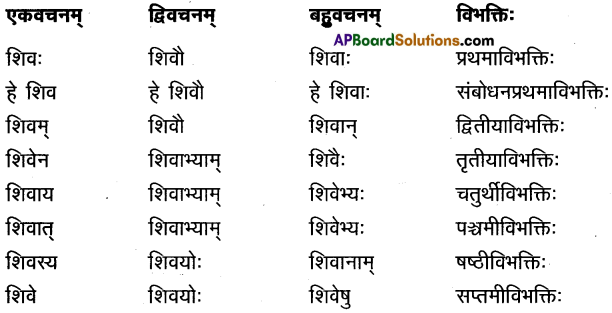
आ) नदी
जवाब:
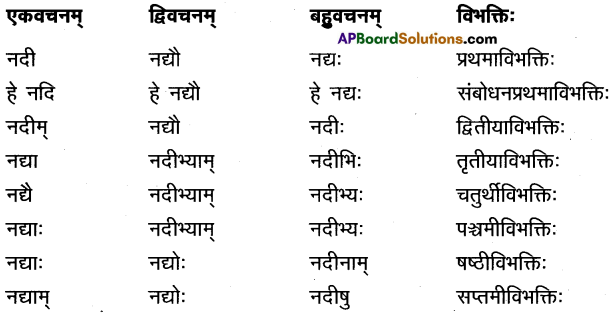
इ) वन
जवाब:
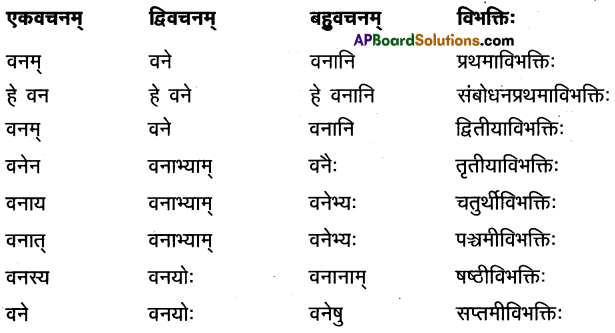
ई) तिद् (पुं.)
जवाब:
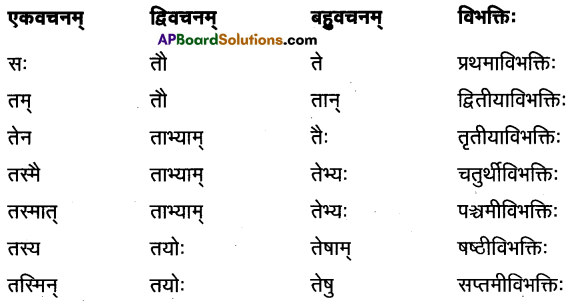
![]()
XI. द्वयोः धातुरूपाणि लिखत । (2 × 3 = 6M)
अ) गच्छतु
जवाब:

आ) लेखिष्यति
जवाब:
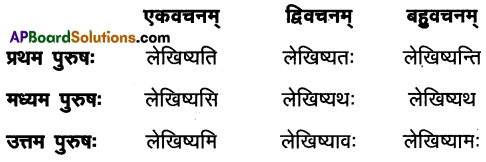
इ) जायेत
जवाब:

ई) भाषिष्यते
जवाब:

XII. त्रीणि सन्धिनामनिर्देशपूर्वकं विघटयत ।
अ) विद्यालयः
जवाब:
विद्या + आलयः = सवर्णदीर्घ सन्धिः
आ) महेन्द्ः
जवाब:
महा + इन्द्रः = गुण सन्धिः
इ) महैरनर्यम्
जवाब:
महा + ऐश्वर्यम = वृद्धि सन्धिः
ई) इत्यत्र
जवाब:
इति + अत्र = यणादेश सन्धिः
उ) भानवे
जवाब:
भानो + ए = अयवायाव सन्धिः
ऊ) प्रथमोऽध्यायः
जवाब:
प्रथमः + अध्यायः = पूर्वरुप सन्धिः
XIII. त्रीणि सन्धिनामनिर्देशपूर्वकं सन्धत्त ।
अ) मही + इन्द्ः
जवाब:
महीन्द्रः = सवर्णदीर्घ सन्धिः
आ) हित + उपदेशः
जवाब:
हितोपदेशः = गुण सन्धिः
इ) वसुधा + एव
जवाब:
वसुधैव = वृद्धि सन्धिः
ई) इति + आदि
जवाब:
इत्यादि = यणादेश सन्धिः
उ) पौ + अक:
जवाब:
पावकः = अयवायाव सन्धिः
ऊ) को + अपि
जवाब:
कोऽपि = पूर्वरुप सन्धिः
![]()
XIV. आन्ध्रभाषायां वा आङ्ग्लभाषायां वा अनुवदत ।
अ) ते परीक्षां लिखन्ति ।
जवाब:
They are writing the exam.
आ) सा क्षीरम् अपिबन् ।
जवाब:
She drank milk.
इ) अहं परीक्षामृ अलिखम् ।
जवाब:
I wrote the exam
ई) वाणी सत्यं वदिष्यति ।
जवाब:
Vani will tell the troth.
उ) विद्यासमं नास्ति शरीरभूषणम ।
जवाब:
There is no ornament like education.
XV. एकेन पदेन समाधत्त ।
अ) दशरथः कां नदीम् अन्वगात् ?
जवाब:
सरयुनदीम् ।
आ) पिनाकपाणिं कां पतिमाप्तुम् इच्छति ?
जवाब:
पार्वती ।
इ) विघ्नभयेम कार्यं कैः न प्रारभ्यते ?
जवाब:
नीचैः ।
ई) प्रवासेषु मित्रं किम् ?
जवाब:
विद्या ।
उ) कः लङ्कां दग्धवान् ?
जवाब:
हनुमान् ।
XVI. एकेन पदेन समाधत्त ।
अ) कपिञ्जलः कः ?
जवाब:
पुण्डरीकस्य मित्रम् ।
आ) भोजस्य औदार्यम् इति पाठय भागः केन विरचितः ?
जवाब:
बल्लाल कविना |
इ) तीक्ष्णदंष्ट्रः कः ?
जवाब:
अरण्यमार्जरः ।
ई) स्वेदस्य पुष्पाणि इति पाठ्यभागः कस्मात् स्वीकृतः ?
जवाब:
मधुराः कयाः इत्यस्मात् ग्रन्थात् ।
उ) वायुः कान् चालयति ?
जवाब:
मेधान् ।